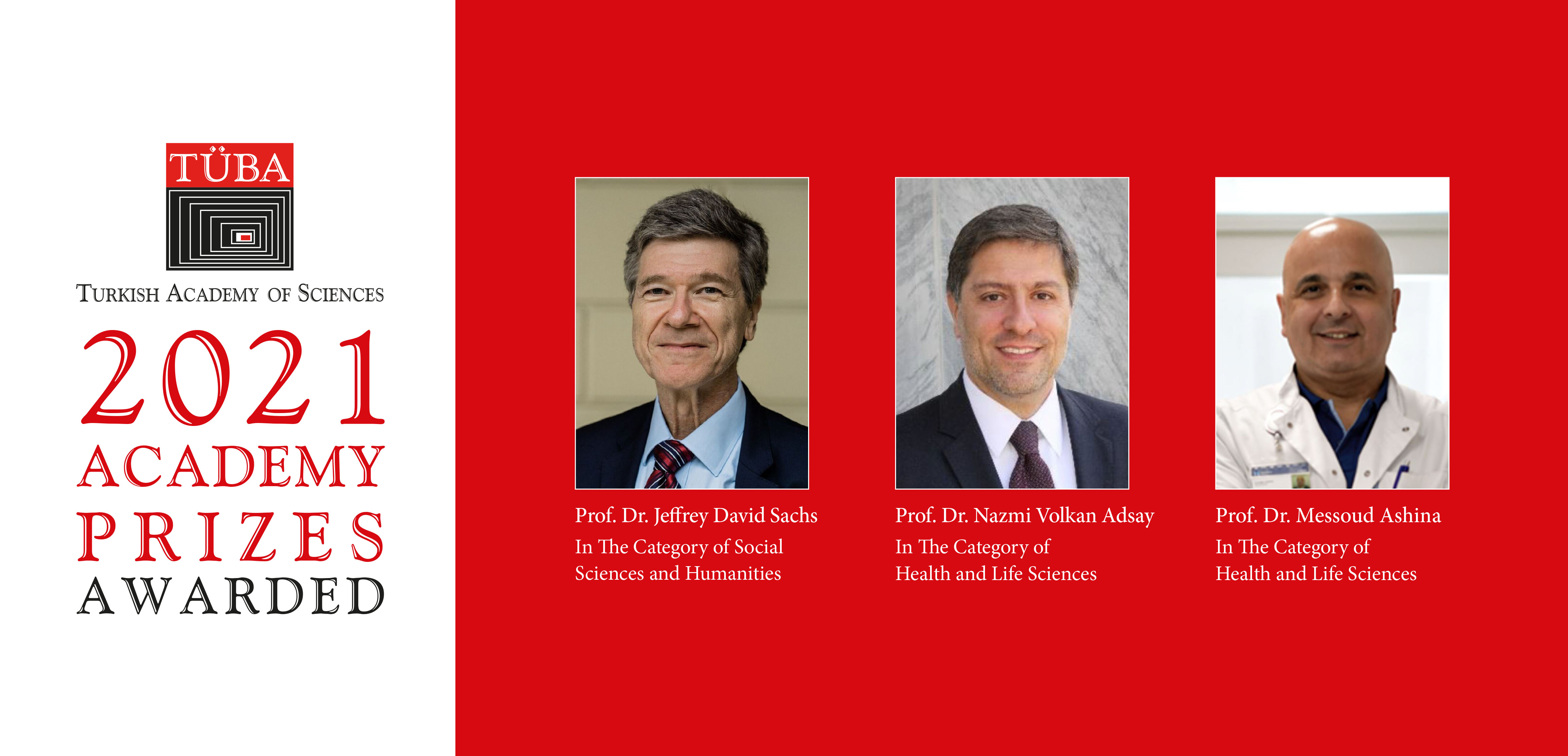2021 Academy Prize Laureates

A total of three scientists in two categories, Social Sciences and Humanities and Health and Life Sciences, have been awarded to the 2021 TÜBA Academy Prizes, which is held by TÜBA within the scope of the mission of appreciation and encouragement of eminent scientists and is open to all scientists in the world.
Scientists deemed worthy of TÜBA Academy Prizes by the TÜBA Academy Council as a result of domestic and foreign referee views and evaluation of field committees:
In Social Sciences and Humanities
Prof. Dr. Jeffrey David Sachs from Columbia University has been awarded with 2021 TÜBA Academy Prize in the Social Sciences and Humanities for his scientific, technical, and effective studies on globalization and sustainable development, responsible production and consumption mechanisms, combating diseases, and besides theoretical research his efforts to raise awareness and ethical stance in the titles of reducing extreme poverty, eliminating income injustice, the damages of colonialism with visiting more than 130 countries all over the world.
In Health and Life Sciences
Prof. Dr. Nazmi Volkan Adsay from Koç University, has been awarded with 2021 TÜBA Academy Prize in the Health and Life Sciences for describing tumor types such as intraductal oncocytic papillary neoplasia of the pancreas, colloidal carcinoma of the pancreas. In addition, he was one of the first to describe intraductal tubulopapillary neoplasia, one of the rare types of pancreas tumors, and to provide a new window for differential diagnosis, diagnosis, and treatment for several patients who have difficulty in diagnosis with the concept of paraduodenal pancreatitis.
Prof. Dr. Messoud Ashina from Copenhagen University, has been awarded with 2021 TÜBA Academy Prize in the Health and Life Sciences, for his studies that uncover the signaling mechanisms that trigger migraine headache, describe new molecules by studies on patients, clarify the neurovascular mechanisms that initiate migraine and highlight the clinical importance and therapeutic potential of the neuropeptide PACAP-38.
Prof. Dr. Jeffrey David Sachs was born in 1954. Dr. Sachs received master’s degree in 1978 and doctorate in 1980 from Harvard University, Department of Economics. Currently working as a faculty member at Columbia University in New York, Prof. Dr. Jeffrey D. Sachs is the director of the United Nations Sustainable Development Solutions Network System. Sachs has held various managerial positions within international sustainable development organizations and worked as visiting scientist and researcher at universities and research institutions in many countries. He also worked as a consultant in programs operating at the international level and in the field of economic development. He also carried out studies in the context of ethical economy along with sustainable growth and development issues.
Prof. Dr. Nazmi Volkan Adsay; He was graduated from TED Ankara College in 1982 and from Hacettepe University Faculty of Medicine in 1988. He specialized in Pathology and Laboratory Sciences in the United States and was certified by the American Board of Pathology. After completing his oncological pathology residency at Memorial Sloan-Kettering Cancer Center, one of the world's leading cancer centers, and furthering his studies with the most important names of this branch, he worked at Michigan Wayne State University for 10 years and became a professor. He moved to Emory University as Director of Pathology in 2007 and continued this position for more than 10 years. He was appointed as the head of Department of Pathology in Koç University School of Medicine in 2008. He received several research and education awards, including American Association of Cancer Research Team Science Award and USA Georgia State Distinguished Cancer Scientist award. In addition, he was involved in the foundation of international Pancreatobiliary Pathology Society and served as its first president.
Prof. Dr. Messoud Ashina; He was born in 1965. After graduating from Azerbaijan Medical University in 1988, he earned his neurology specialization and doctorate from the University of Copenhagen in 2003. He completed his education with Jes Olesen who is one of the leading names in the headache field. He completed his successful academic life in the same university due to his outstanding achievements and he is still serving as the “Human Migraine Research Director”. Prof. Ashina has been the President of the International Headache Society since 2019 and also the President of the Danish Headache Society and the Vice President of the European Headache Society. Prof. Ashina has made significant contributions to science by examining the factors that trigger migraine headache directly with his clinical studies, elucidating the neurovascular mechanisms that initiate migraine and drawing attention to the clinical importance of the neuropeptide PACAP-38.
